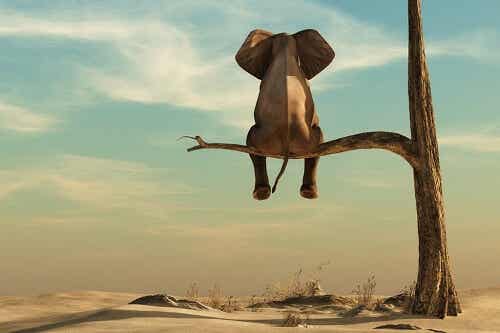Fatphobia is one of the most perverse social consequences. Because of it, we can come to fear the element most deeply linked to our person: our body.

Last update: October 24, 2020
Some people do not embody the characteristics considered normal by society. And the very society, which should feed us, is for some only a source of poisoned water. The product of a network that, contrary to what it should, causes frustration and pain, as well as distorts identity. Fatphobia is one of the phenomena born in recent years.
Fat, flab, are associated with concepts that are anything but positive. And there are those who have nurtured this idea to get rich. Companies looking for the "different" to line their pockets at the expense of people with a body mass index (BMI) that is not low.
Prejudices and origin of fatophobia
As a result of the education received, it often happens to many of us to see a person with a higher BMI than recommended and think that he is dissatisfied. It is an assumption made without knowing the person in front of us, yet we take it for granted that this is the case. At the same time, we just as easily make the mistake of believing that you are totally lacking in the willpower needed to go to the gym or follow a diet.
Our self-centered judgment is reinforced by a mirror effect: our reflected image is positive. We are people with willpower, who take care of themselves, which is why we have a lower BMI.
We assume that overweight people do not like their body and that if they do nothing to change it, it is because their balance is too fragile and their mood too weak in the face of the temptations of food.
It is much easier to assume this line of thinking than to think that an individual is so by choice. In that case we should start wondering if the sacrifices we make are driven by a sincere goal or simply "induced". It is easier to think that they do not change because they are not strong enough; this thought feeds the idea that we, on the other hand, have control over our body, that by doing "things right" we will never get fat. In fact, that's not quite the case.
The sight of an obese person usually triggers a reaction of compassion and pain, similar to what we feel when we are faced with someone who tells us that they are sick. Instead of saying "nice to meet you", it would be more natural for us to say "I'm sorry", "come on", "you can do it".
When the obsession with thinness becomes harmful
Of all phobias, fatphobia is particularly limiting. It presupposes the rejection or the battle towards a part of oneself with which we will live forever; to try would cause us pain, to do so would mean to stop living. Yet, many take this path: they dissociate or ignore their bodies, like someone who tries not to pay attention to a charlatan who, no matter how much he talks, fails to pique our interest.
During this journey, the price to pay becomes very high. We do not pay attention to the signals sent to us by our body, the pain narcotizes us making them unaware of the danger, with often serious physical consequences. Any unpleasant aspect of our body is associated with obesity.
On the other hand, many obese people with fat phobia give up indulging in enjoyable activities such as sports, a day in the pool or a prolonged shower. May it never be that they can be seen, that they see themselves in the mirror, that they reveal a body they hate ...
They stop living in the company of their body, in symbiosis with it. They turn their life into a perennial battle scenario. A struggle often born of a generalized desire or a censorship imposed by society, which points that critical finger totally unaware of the concepts of compassion, understanding or affection.


























